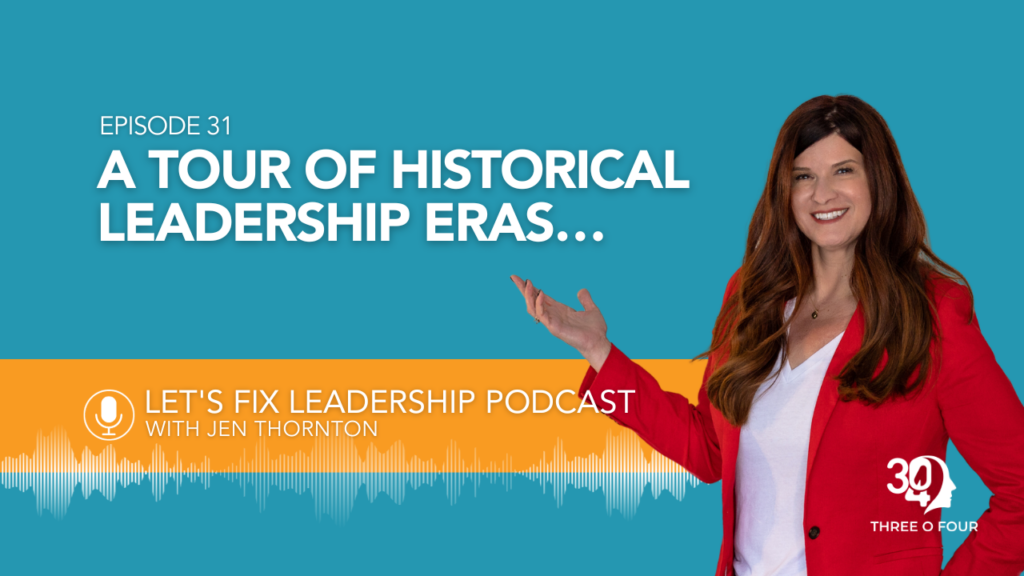[00:00:00] Why did I name my podcast? Let's fix leadership, you ask? Well, let's get into it. Welcome back, friends. This is your place for cutting edge tools, exercises, best practices, and modern leadership strategies. Because when the world is changing, it's time to bring our leadership styles along for the ride.
[00:00:21] Whether you're a company leader, a corporate visionary, an entrepreneur, this show gives you new insights into the neuroscience And the language of leadership plus practical steps and tips to lead your team in a powerful way. It'll also help you keep your people happy and engaged all while achieving your biggest goals.
[00:00:40] I'm your host, Jen Thornton. I'm a talent strategist, a brain-based executive coach, speaker, and the founder of 3 0 4 coaching. Now, let's fix leadership. Ever have someone ask you why you do something in the kitchen a specific way, or how you specifically clean something or why you even. Cut your grass a certain way.
[00:01:02] I bet it's because that's just how you were taught to do it. Leadership, like many concepts, are passed down through generations. And many of the leadership styles you're using today and the ones you're teaching the generation behind you are from a time when the world looked much different than it looks today.
[00:01:22] Leadership styles, when passed down to a generation who works differently than the past, just don't work. It's why every generation complains about the next generation in the workplace. The leader thinks the next generation just doesn't get it. But what if the leader is trying to lead with outdated views?
[00:01:44] Could this even be possible? Well, let's pause for a quick history lesson. I think you'll find this really interesting. And yes, there is actual documented history of leadership theory out there. Any guesses what the first leadership theory was named? Well, if you guessed the great man, you are a winner. Or as my dad likes to say, winner, winner, chicken dinner.
[00:02:10] The Great Man Theory was a concept from the early 19th century that implied you were born a leader. It was just in your DNA. Also, it believed that only men could be born with it, um, and you can probably hear my eyes rolling right now. Um, this theory was flawed for a number of obvious reasons, but one of those reasons is it didn't take into account the importance of situational factors and the ability to learn and develop skills over time.
[00:02:40] Then came the Industrial Revolution, which brought significant change to how people worked. We went from only leading large groups, if we were in the military or the government, to leading large groups of people in factories. And at this time, leadership was only focused on one thing, and it was what was called the science of efficiency and productivity.
[00:03:02] Everyone needed to be doing the exact same thing and doing it perfectly and doing it all at the same speed.
[00:03:12] Let's take a quick break from the conversation. Do you have new leaders on your team and you can see their potential, you can see their runway but you cannot figure out how to get them across the finish line? Reach out to 304 Coaching and learn more about our brain based, competency focused executive coaching.
[00:03:32] Then came what is known as the human relations era. And in the thirties and fifties, um, I guess that's when we kind of started thinking about our employees as actual humans and not just something on a factory line. This was the first time there were conversations around people oriented leadership. And as always, there was some key social changes that drove a change in how we lead.
[00:03:59] This is when you first started hearing about groups of workers banding together to demand safer working conditions. Change only comes when it's forced, and this is another great example about how a new generation was forcing leaders to think about leading differently. And as time moved on, you started hearing more about situational leadership.
[00:04:20] The workplaces were modernizing, and in the 60s and 70s, there was a lot of political view changes and a lot of social changes, and once again, the world forced leaders to adapt. And for the first time, the conversation switched to the leader actually adapting their approach based on a situation and based on the person.
[00:04:43] And as we get to more modern times, the 80s brought us what's called transactional leadership. And really, that's the idea. There was an exchange of reward for work. Um, and this is when we started using terms like make sure you're motivating your team. It's all about motivation. Um, and as we entered into the 21st century, we started hearing terms like servant leadership and ethical leadership, and that brings us to today.
[00:05:09] If there are any of these models that were passed down to you and you're trying to adapt them for modern use, you might be struggling to Because today is just different. So how do we lead in today's world? If I had the perfect answer for that, believe me, I would be sharing it with you right now. I'd be sharing it with the world right now.
[00:05:31] But I do have some ideas. In today's world, you have to recognize we are prehistoric creatures living in a modern world with alien like technologies. Leading today is understanding the neuroscience behind fear. It's really about leading in a way that reduces fear in the workplace to help people lead from a place of confidence and respect.
[00:05:56] It's all about adapting to all types of working arrangements and leading what we call the whole person. It's leading people that do jobs that you don't know how to do because the world is moving so fast that it's impossible to stay on top of everything. It's really about understanding your own fears and how to lead with clarity and purpose and not fear and perfectionism.
[00:06:21] And how about getting really comfortable with adapting to constant change? I know that would help us all. I know that I don't have to tell you that today's work environment is incredibly complex. And this takes us back to my opening question. Why did I name my podcast Let's Fix Leadership? Because I know leadership is ever evolving and it will actually never be fixed.
[00:06:48] It's something that will always be evolving based on the current environment. It's been that way since the beginning of time, and I know it will always be evolving because the world is always evolving. Fixing leadership isn't about a firm solution. It's about leading from a place of curiosity, respect, openness, kindness.
[00:07:08] It's about knowing what works today. Might not work tomorrow and getting okay with that because just like leadership, it's always evolving. We as humans can always evolve with it. Thanks for listening to Let's Fix Leadership. By hanging out with me today, you're already on your path. If you're looking to learn more and to see if your company is a good fit for our coaching and leadership education, then hey, visit 304 coaching.com.
[00:07:38] If you got value out of this podcast, share it with a friend, and it would mean the world to me if you would leave a thoughtful review and a rating on iTunes. Thanks again for listening, and I appreciate your work in fixing leadership.
 Change only comes when it’s forced. A new generation forces leaders to think about leading differently. - Jen Thornton
Change only comes when it’s forced. A new generation forces leaders to think about leading differently. - Jen Thornton 


